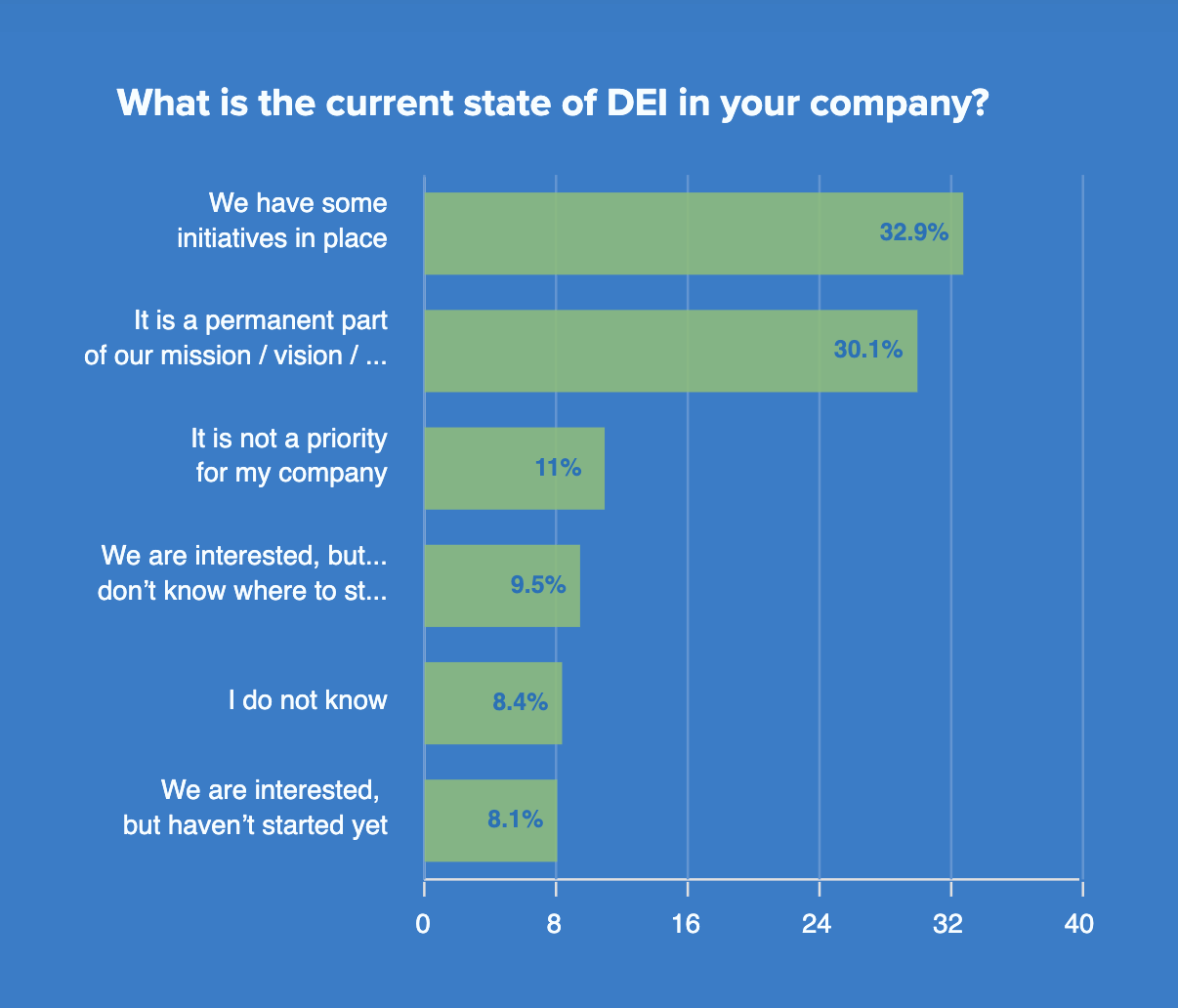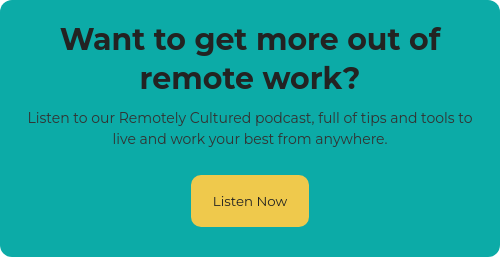Let's get right to the point. Diversity, equity, and inclusion are having a moment. But before we start patting ourselves on the back, remember this: DEI should always be a driving force at any company — not a trend or a fad. And while it's great that there's new awareness of DEI initiatives and their importance in workplace culture, it doesn't negate the fact that we need to do better as business owners and founders.

The numbers don't lie. Less than a third of companies have instituted DEI practices and initiatives as a permanent fixture in the workplace. And even in our modern workforce, minorities face overwhelming barriers to climbing the corporate ladder.
On fully remote teams, the challenges can be even tougher to overcome. People of color were inordinately impacted by the COVID-19 crisis, with many not offered the same opportunities to work from home or go remote as their white counterparts. Women also shouldered more of the burden of the pandemic, often juggling the increasing weight of managing childcare and family/home responsibilities disproportionately to men.
So how do we commit to DEI in a fully remote environment? We'll explore that, but first, let's look at some of the challenges remote teams face in incorporating DEI.
Challenges of Remote DEI
While remote work offers some unique opportunities to implement DEI initiatives, it also comes with some hurdles.
Lack of Connection
During the pandemic, remote workers reported experiencing loneliness and depression at a higher rate. The interpersonal connection that is inherently fostered in a traditional office setting was gone. For minority employees, the impact was even greater, as many said they didn't feel seen or acknowledged. This also affected how DEI initiatives are implemented. Rather than in-person meetings, trainings, and education, DEI became little more than a policy or statement. Words on a screen, rather than a measurable and actionable part of company culture.
Disproportionate Privilege
In an office setting, all employees have the same access to hardware and high-speed internet — all in a carefully designed work environment. On remote teams, it's critical to remember that not every employee will have the same access. Stable, affordable Wi-Fi is still a privilege in many areas — so is having the latest and greatest tools and technology and a quiet, dedicated workspace.
Gender Gap
In many cultures and geographic locations, women are still expected to be the primary caretakers, whether that care is for minor children or older family members. They may not have the same flexibility when working from home if they also have a dependent to care for. This is partly why women still lag behind men in attaining leadership roles and struggle to be given the same workload (and acknowledgment) as men.
Other Barriers
In fully distributed teams, there are other challenges that, while not exclusively DEI-related, may affect minority employees more than others. This can include working from different time zones, speaking English as a second (or third or fourth) language, and requiring time off for cultural or religious holidays and events.
Fortunately, remote teams also open up new and exciting opportunities to encourage DEI initiatives.
How to Get DEI Right in a Remote Work Environment
Remember: DEI is not just a policy or a statement. If you aren't practicing what you preach, your employees will suffer, and eventually, your company will, too. So how do you foster diversity, equity, and inclusion on a remote team?
Hire the Best Talent
One of the biggest benefits of a strong DEI initiative is that it attracts top talent. In fact, 39 percent of job seekers say they have (or would have) turned down a job offer from a company that doesn't value inclusion.
This is true across racial, gender, and cultural backgrounds. A focus on DEI, and living it out as a core value, will bring in the best remote employees. And when you have the entire world as your talent pool, you'll be able to build a team of diverse backgrounds and experiences.
Celebrate and Embrace Differences
If every person on your team came from the same culture, had the same experiences, and worked in the same way, it would be a pretty dull place. Acknowledging and celebrating differences encourages team members to hear different perspectives and sparks creativity and collaboration. It also fosters a sense of belonging.
At First Page, one of our team members came on board several years ago. At the time, they chose to go by a nickname — a shortened version of their given name. It was easy to spell and easy to pronounce...but it wasn't their name. Recently, that team member made a request of colleagues and leadership to switch to their given name. The team stepped up by immediately making the change and honoring the name's cultural significance and the employee's connection with their identity. A new email was created for them, and other team members began calling them by their preferred name.
The team member says:
It took me a while to speak up about this, even though it would seem like the easiest thing to do. After all, it's my name, right? That wasn't because First Page lacked empathy; I was just trying not to put anyone on the spot. But I really wanted to be called by my name, as that's my identity. I am glad I did and everyone was so supportive. I love that.
This doesn't just apply to names, but pronouns as well. Allow employees a space (on your website, your Slack channels, or project management platform) to make their preferred names and pronouns visible. Missteps will happen, but encourage discussion (especially if it's a change from how the employee was previously addressed) and give gentle reminders if and when a team member slips up.
Make DEI Fun
Yes, it can be a sensitive subject, but DEI can also be an opportunity to learn and grow in a safe and respectful environment. It can also be enjoyable. Here are some great DEI initiatives you can incorporate that celebrate different cultures and backgrounds:
- Celebrate holidays and heritage months across cultures. Ask a team member to share the traditions of their Diwali celebration or mark Juneteenth with a virtual gathering.
- Host a DEI-focused book club. Maybe you already have a business book club. If so, try selecting books by women, BIPOC, or LGBTQ+ authors. Or choose non-business books that share different cultural or racial experiences. Be sure to add a Slack channel or create a space for discussion.
- Speak the universal language: food. Food is a cornerstone of any culture and is something that immediately brings people together (everyone's gotta eat, right?). Ask team members to share favorite family recipes or invite the team to participate in a virtual cooking class together.
- Explore a museum together...virtually. As the pandemic forced lockdowns around the world, many museums began to offer virtual tours and exhibits. Choose one your team can browse together, such as the Women's History Museum or the U.S. Holocaust Memorial Museum. Open up discussions around the culture and history of the exhibits and how it's influenced society's views in the present day.
Lead with Empathy
DEI starts from the top down, and if your leaders aren't committed to it, it sets a tone that exclusion and privilege will be tolerated. If leaders cannot show compassion and understanding, how will team members be expected to do the same? Leading with empathy is crucial to DEI in that it opens up safe spaces to discuss concerns, navigate conflict, and address the challenges faced by employees of varying backgrounds. It's even more critical on a remote team, where face-to-face communication is not often a possibility and asynchronous communication is more heavily relied on.
How First Page Does DEI
We're not perfect, but we're learning as we go, and we embrace our diverse, global team and celebrate our different cultures, backgrounds, and experiences. We strongly believe:
- Black lives matter.
- Women are equally as capable and competent as men.
- Love is love is love.
- Human beings deserve to be treated with dignity and respect, regardless of race, religious beliefs, sexual orientation, or background.
With that in mind, at First Page, we have committed to:
- Always having a majority of women on our team. We are woman-owned and will always have more than 50 percent women in our roles.
- Representing diversity through our team. Our goal is to always have, at minimum, 30 percent of team members from the BIPOC and LGTBQ+ communities.
- Being leaders in remote DEI. We are a part of the Small Agency Collective for Diversity, Equity, and Inclusion, offering DEI training and mentorship to marketing agencies.
Committing to DEI, especially on a remote team, isn't easy. But the rewards are so worth the challenges.






